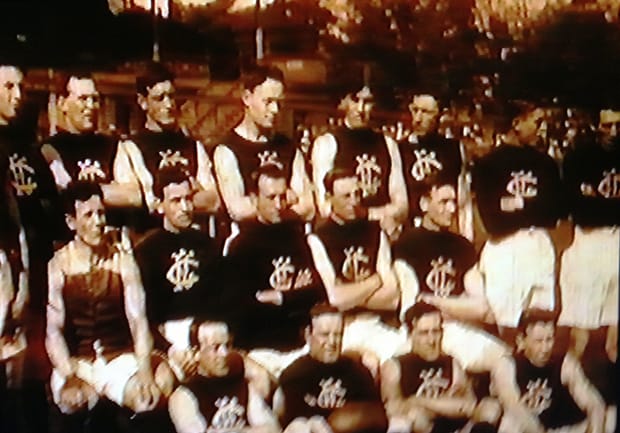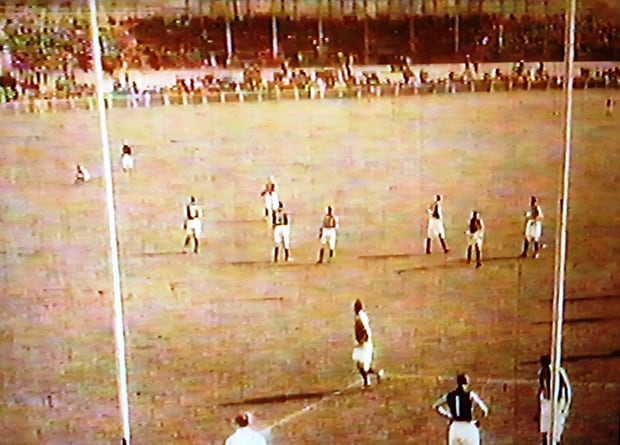One hundred years after the event, the National Film and Sound Archive of Australia has made available rare footage of a match involving Carlton and Australian soldiers – some of whom were barely months from paying the ultimate sacrifice for their country on the field of battle - in what was a fundraiser for the Great War’s Wounded Soldiers Fund.
The contest, which pitted members of Carlton’s 1915 premiership team against League footballers who had enlisted for military service, took place on the Melbourne Cricket Ground on Saturday, September 25 of that year - seven days after the old dark Navy Blues had secured their fifth VFL pennant with a 33-point win over Collingwood on that very ground.
The few precious seconds of footage shows the two teams lining up before the contest, with renowned Carlton footballers like Rod “Wee” McGregor, Paddy O’Brien and the club’s only five-time Premiership player “Champagne” Charlie Hammond amongst the Carltonites posing for the camera.
Billy Dick, the captain of Carlton’s 1914 Premiership team whose ten-match suspension for belting Fitzroy’s Jack Cooper and abusing the field umpire cost him his place in the ’15 Grand Final victory, also appears, in what was his comeback match of sorts.
The soldiers sport what appears to be the vertical-striped guernseys of Collingwood. Though their identities are not revealed in the film, the following teams story which appeared in The Argus nine days before the match sheds some precious light.
LEAGUE PREMIERS v CAMP TEAM
The following have been selected to represent the League team who have been enlisted in the Australian Imperial Force to play against the League premiers, at the Melbourne Cricket-ground on Saturday, 25th inst., in aid of the Wounded Soldiers’ Fund: Baud, Burleigh, Challis, Danks, Evans, Heinz, Jackson, King, Lilley, Lowrie, McIntosh, Nolan, Orchard, Rowan, Seddon, Sloss, Sheehan and Thomas.
Should any of the foregoing be unavailable, the following will take their places:- Collins, Freeman, Fraser, Fielding, Heron, Lowell, Triplett.

The Carlton team to take on the soldiers, pre-match 1915.
Working off the aforementioned surnames, those listed as potential starters for the soldiers team include no fewer than eight League footballers who lost their lives within three years of this match.
They were as follows;
George David Challis, the 70-game Carlton premiership player of 1915 who died when a heavy-calibre German artillery shell hit his trench in Amentières, France, on July 15, 1916;
Harry Collins, the six-game Fitzroy footballer, who was awarded the Distinguished Conduct Medal for bravery before he died at Villers-Bretonneux on August 10, 1918;
Jack Freeman, the 22-game South Melbourne footballer, who died in a hospital on his 25th birthday, having had both legs amputated after being badly wounded in Rouen on November 15, 1916;
Frederick Richard McIntosh, the 39-game University and Essendon footballer who was fatally wounded at Polygon Wood, Belgium, on September 28, 1917;
William “Barney” Nolan, the 30-game Richmond footballer who died of gunshot wounds sustained in Fleurbaix on July 23, 1916;
Percy Edward Rowe (aka Paddy Rowan), the 82-game Collingwood footballer who died of shrapnel wounds at the Battle of the Somme on December 5, 1916;
Bruce Moses Farquhar Sloss, the 84-game Essendon and South Melbourne footballer, who was killed when a German shell showered him with white-hot shrapnel at Amentières, France on January 4, 1917, and;
Claude Edison Thomas, the 13-game South Melbourne footballer who was killed in action at Hamel, France on July 5, 1918, one month before his brother.
On the Monday after the game, the following match report penned by an unnamed correspondent for The Argus appeared;
SOLDIERS’ MATCH. CAMP TEAM v CARLTON
The match arranged between a team of prominent League footballers who have volunteered for service with the Expeditionary Forces, and the Carlton team (premiers of the League for the season), attracted about 6000 people to the Melbourne Cricket ground on Saturday, the attendance being in that respect disappointing, as the proceeds were for the Australian Wounded Soldiers’ Fund.
A sum of £218 was taken at the gates, and £30 in collection boxes, making £248 for the match while the expenses were about £20. There was some disappointment at the absence of both Seddon and Rowan of Collingwood, the Soldiers being thus weakened in the ruck.
There was a strong wind blowing towards the grandstand end of the ground, and Carlton had first use of it. Both sides threw themselves into the game with considerable dash, though all through it was not quite so seriously played as a premiership game would have been, and the high wind spoiled the skill to some extent. Still, the Soldiers did remarkably well in keeping Carlton down to a score of 3 goals for the first quarter, and getting the same number them- selves, the points at quarter time being Carlton, 5-6, to the Soldiers’ 3-1.
In the second quarter, when they had the wind, the camp men played with very considerable dash. Carlton only scored a goal in that quarter, while the Soldiers put on 4, and at half-time they had a very substantial lead with 7 goals 4 behinds to Carlton’s 4-5.
The match was won in the first 10 minutes of the third quarter, when Carlton getting a rush on, scored goal after goal, until they had added 6 goals to their score. After that the play became even again; and at three-quarter time Carlton had 12-8 to the Soldiers’ 9-4.
In the last stage, Carlton’s defence was the best feature of the match, and holding their own to the finish they won with the scores as follows: CARLTON, 13 goals 11 behinds (89 points); SOLDIERS, 10 goals 9 behinds (69 points).

Rare match footage.
On the winning side Jamieson, Brown and McDonald were prominent in defence, McGregor about the centre, Valentine and Fisher half-forward, Hammond and Sharp in the rucks, but O’Brien, whether placed or following, was the best man on the side, and, in addition he scored 3 goals, while Gardiner was also successful in goal kicking. On the camp side the most successful men were Maclntosh (Essendon), Evans (Melbourne), Baud, Challis and Burleigh (Carlton), Orchard (Geelong), Fielding (St. Kilda), and King (Fitzroy). Their best sharp-shooters were Burleigh and Fielding.
The most attractive feature of the match was really the marching and music of the Broad- meadows Military Band, which made a very fine impression.
That football was played at all through this wartime period was something of a minor miracle. In July 1915, at a special meeting convened by the VFL at which Charles Brownlow presided, a majority of clubs voted in favour of a curtailment of the season. But as the vote required a three-fourths majority to rescind the original arrangement the motion lapsed.
Voting for the motion were delegates from Melbourne, St Kilda, Geelong, Essendon and South Melbourne, with delegates from Carlton, Collingwood, Fitzroy and Richmond voting against.
Carlton President Alderman John Gardiner was resolute in affirming his club’s stance.
“The Carlton committee and players are unanimously of opinion that the season should be played out. The players have already agreed to reductions in their remuneration until they are at bedrock. The financial situation has forced this,” Gardiner said.
“The game provides amusement of thousands who cannot enlist, including many women, who thus obtain a relaxation from their domestic duties. We do not care if we do not take a penny out of the game till the end of the season, but we must keep faith with our members and the public.”
The Soldiers Match was later acknowledged in Carlton’s Annual Report of that year, under the subheading “Football and the War”.
According to the report: “A match between your team and a Camp team, at the end of the season, realised over £200”.
“The Committee fervently hope that by the beginning of the next football season, or, at any rate, during its currency, this terrible war will be brought to a successful conclusion, in a decisive victory for Great Britain and her Allies. The Club and players have done much to assist the war funds in various ways; £76 was realised at the match at Ballarat (last Easter) with the Golden Point Club.
Those interested in viewing a digitized version of the Carlton v Soldiers Match of September 1915 can do so at the Melbourne Access Centre


